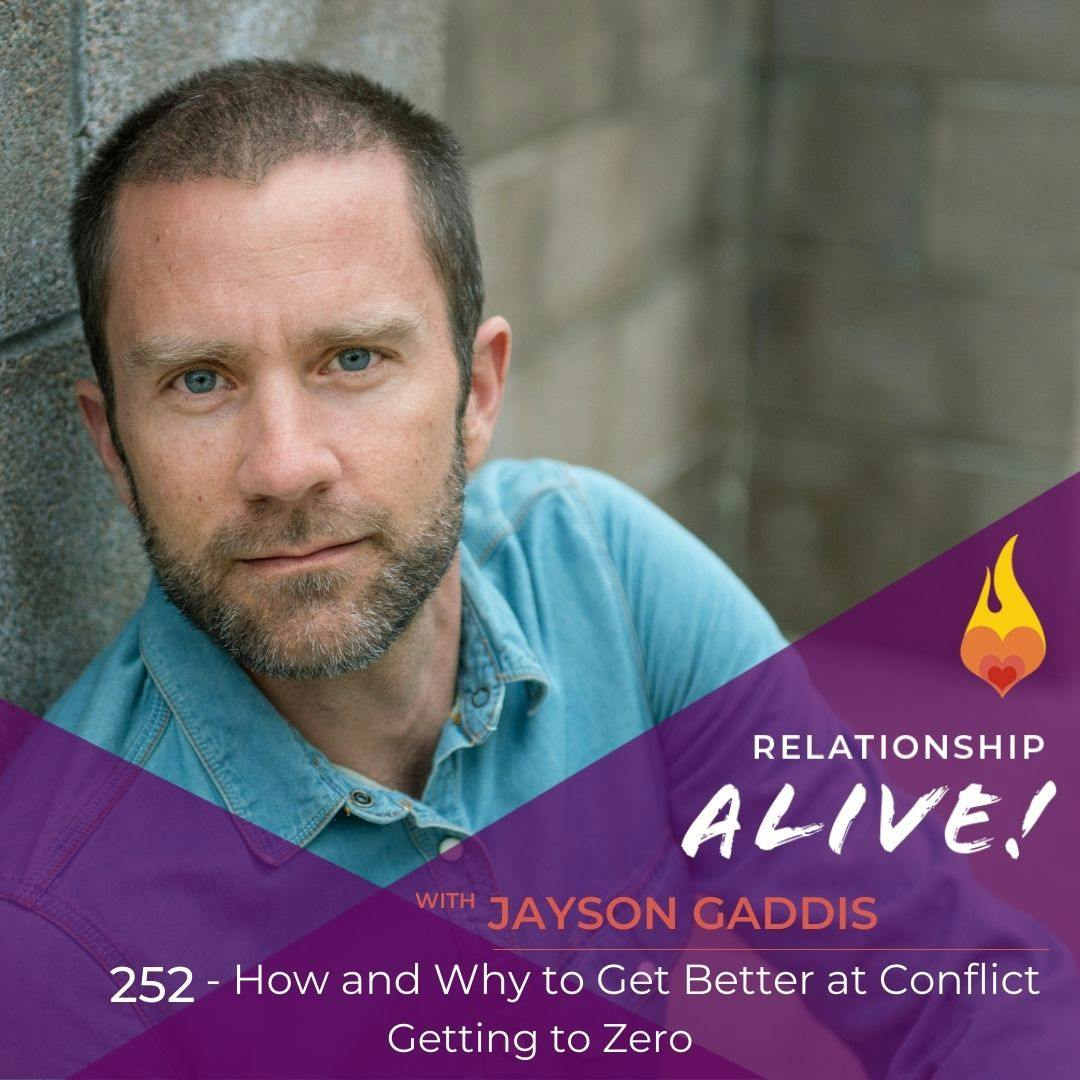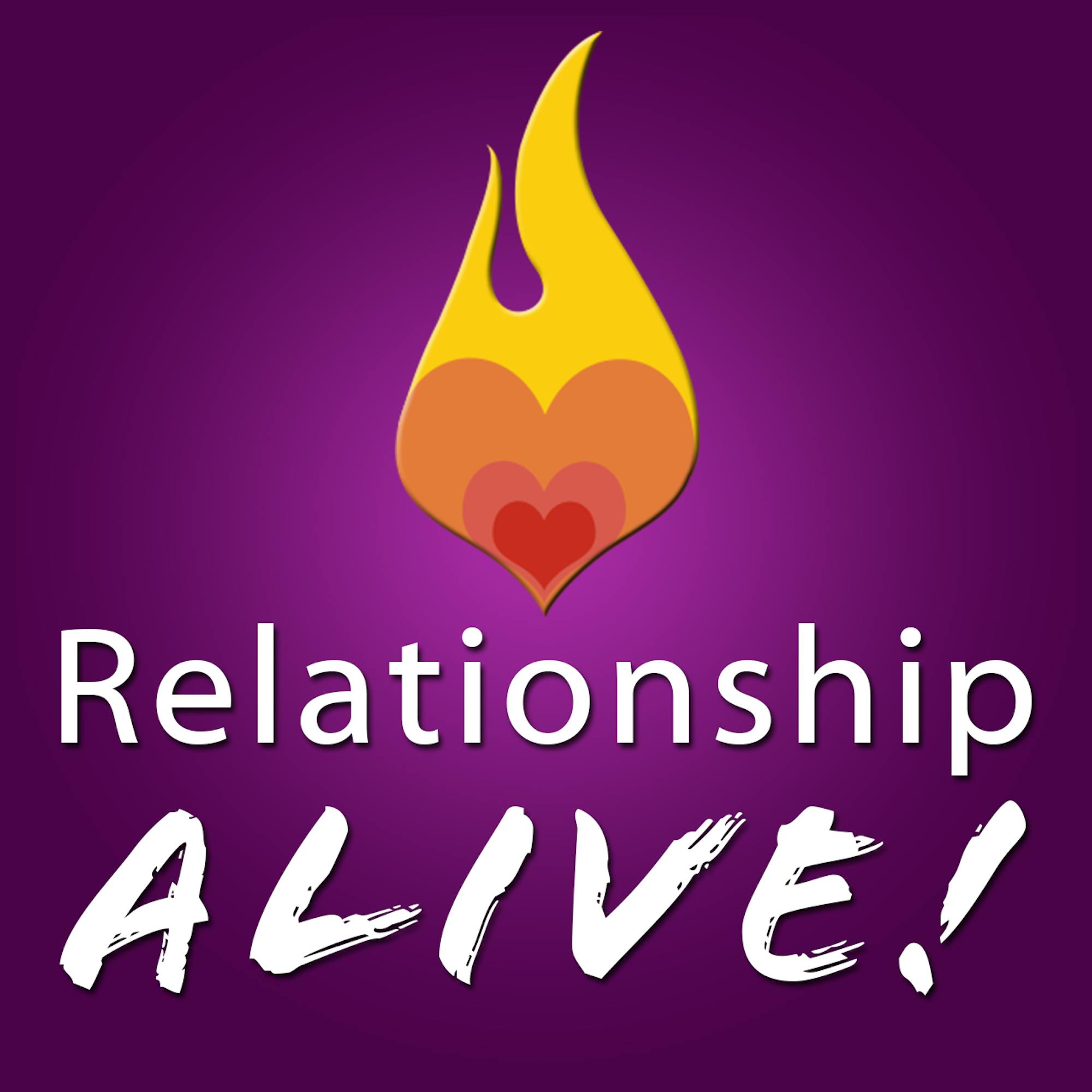
252: How and Why to Get Better at Conflict - Getting to Zero with Jayson Gaddis

Relationship Alive!
Deep Dive
- People avoid conflict due to biological and psychological reasons.
- Avoiding conflict leads to a decline in relationship quality and self-identity.
- Jayson Gaddis' book "Getting to Zero" provides practical tools for conflict resolution.
Shownotes Transcript
When you can't be yourself in your relationship and avoid the tough conversations that you might need to have, it erodes your relationship AND your sense of self. Today we're going to focus on how to lean into conflict in ways most likely to lead to deeper connection with others as well as inner alignment within yourself. Our guest is Jayson Gaddis, and his new book "Getting to Zero: How to Work Through Conflict in Your High Stakes Relationships" is a masterpiece to level up your conflict-resolution skills.
If you’re curious to hear our first episode together, check out Episode 129 - Unlocking the Secrets of the Smart Couple).
And as always, I’m looking forward to your thoughts on this episode and what revelations and questions it creates for you. Please join us in the Relationship Alive Community on Facebook) to chat about it!
Sponsors:
Want something new to entertain you? Acorn TV) is a commercial-free streaming service that’s rooted in British television. It’s home to sophisticated and artful storytelling with top-rated mysteries, dramas that pull you in, heart-felt comedies and so much more. So - Escape to Britain and beyond without leaving your seat. Try Acorn TV free for 30 days, by going to acorn.tv) and using the promo code “alive” (lowercase) at checkout.
Find a quality therapist, online, to support you and work on the places where you’re stuck. For 10% off your first month, visit Betterhelp.com/ALIVE) to fill out the quick questionnaire and get paired with a therapist who’s right for you.
Resources:
Find out more about Jayson Gaddis's new book, Getting to Zero).
Visit The Relationship School website) for more information about Jayson, his podcast, and the courses and trainings that he offers.
FREE Relationship Communication Secrets) Guide - perfect help for handling conflict and shifting the codependent patterns in your relationship
Or...check out the Secrets of Relationship Communication complete course)!
Guide to Understanding Your Needs (and Your Partner's Needs) in Your Relationship) (ALSO FREE)
Visit www.neilsattin.com/zero) to download the transcript, or text “PASSION” to 33444 and follow the instructions to download the transcript to this episode with Jayson Gaddis.
Amazing intro/outro music graciously provided courtesy of: The Railsplitters - Check them Out)
Transcript:
Neil Sattin: Hello, and welcome to another episode of Relationship Alive. This is your host, Neil Sattin. When it comes to the relationships in our lives that matter the most, I want you to sit there and think for a moment about whether or not you're willing to really get into it with those people. Are you willing to have conflict when you don't see eye to eye, when you have a disagreement, when you have a values conflict, when you're not sure who should be doing the dishes and who should be balancing a checkbook, whatever it is, are you actually willing to go toe to toe as equals with the other people in your life? And if so, how well does it go? And if not, why do you avoid it? These are important questions to be asking because the quality of our relationships is often not only determined by the quality of our connection with those people, but it's also determined by our ability to come back from challenging moments, the resilience of a relationship.
Neil Sattin: And so for today's episode, I wanted to focus on that very thing. How do you work through conflict and create resilience, not only in yourself, not only fostering it in the other important people in your life, but how do you create a resilient relationship where you are able to be true to who you are, and where the person or people that you're in relationship with are also free to be true to who they are. And where somehow you manage to get through all of that, better for it, instead of in tatters because of your fights and inability to resolve them. So in order to have today's conversation, I wanted to feature Jayson Gaddis, who is the founder of The Relationship School, a colleague and friend of mine. He also does The Relationship School Podcast, and he is the author of this gem of a book called; Getting to Zero: How to Work Through Conflict in Your High-Stakes Relationships. If you're a long-time listener, you know that I read a lot of books for this show, and this book is a game changer. It is like you will be doing yourself a huge favor by getting this book, reading through it, working through the exercises, and...
Neil Sattin: I don't often truly feel that way, like sometimes, when we're talking about a book here on the show, I'll go through it and I feel like actually, I can kind of mine what's important for you, this is one that I want you to get and go through, it's that important. And when you do, let me know what you think. Let's dive in to chatting with Jayson Gaddis about his new book, Getting to Zero and How to Work Through Conflict in Your High-Stakes Relationships. Jayson, it's such a treat to have you back here on Relationship Alive.
Jayson Gaddis: Thanks Neil. So good to be chatting with you again and psyched to dive in.
Neil Sattin: Great. Great. So let's get started by talking about why we tend to avoid conflict, and I just want to say when I was reading Getting to Zero, this book was very triggering for me like as I was reading it through, I was like every page I was dealing with my own demons percolating up, because the very first thing that you ask us as readers to do is to think about a conflict that we've had with someone who's important in our lives. And so it's helpful to do that, of course, to put all the exercises and everything that you write into contacts, that will be really helpful, but it was really challenging and I got in touch with how hard it is to actually face in to the fire. So could we start by talking a little bit about kind of why people avoid conflict and why you might want to make a different choice.
Jayson Gaddis: Yeah, for sure. So I'll talk about two main reasons, and I'm sure you have many, and I'd love to hear those, but one is just in our biology, and it's the fact that we're social mammals and social mammals like to belong and we like to feel close to other people, and when we don't, it feels threatening and scary and shameful, and painful. And so conflict puts us up against that pain where it's like, "Ooh, if this doesn't go well, I might get kicked out of the group, I might not be included anymore or invited, this person might break up with me, I might break up with them." And that's uncomfortable, and social mammals don't like to be alone, and we don't do well on our own for long, long, long periods of time. So that's kind of in our DNA. And then there's the more psychological story about why we avoid conflict, and that's partly due to, it hasn't gone that well in our history, and that circles back to our family of origin, the neighborhood we grew up in, the friends we had or didn't have, the church we grew up in, sports teams we were on, or dance recitals we played, and all the negative experiences socially and relationally often don't get dealt with very well.
Jayson Gaddis: And then they compound over time, and then we enter into an adult relationship, and we've got a lot of negative memory around conflict and negative associations, and so we tend to do what we've always done, and that's usually moving away from conflict, which is avoiding or we might move toward it thinking that fighting harder and louder and getting bigger is the solution for some reason. So I think those are the two probably biggest reasons we avoid conflict.
Neil Sattin: Yeah, and conflict is uncomfortable. So you have to be in a space where you're willing to not only embrace that discomfort, but also, I think face your own discomfort with being uncomfortable, you have to look at why you would rather just check out and watch Netflix or pretend that something didn't happen or settle for whatever the situation is versus, Oh, it's actually really challenging to me to feel these feelings and to not know if there's going to be a positive outcome on the other side.
Jayson Gaddis: Yeah, yeah, exactly. And I like what you said there about just discomfort. It kind of boils down to that really, is a lot of us don't like feeling uncomfortable feelings, both emotionally and on a sensory level in our body, when we face off with another person or we have a trigger with a person, whether they're silent with us or aggressive with us. It's just so uncomfortable and people are like, Oh, you must really like conflict. I'm like, No, I do not like conflict. Let's be clear. Just like the next person, I just happen to have some tools and some ways through it that I've learned over the years...
Interested in reading the transcript for the rest of this episode with Jayson Gaddis?
Click here to download the full transcript of this episode!)